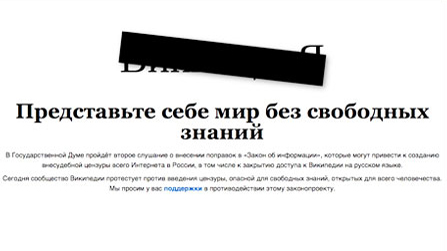Wikipedia goes dark to protest web censorship in Russia
On blacked-out Wikipedia, facts find you

Wikipedia has closed its virtual doors for a day in Russia over the government's plans to create an internet blacklist.
Russian fact-hunters were faced with little more than an obscured Wikipedia logo this morning as the 24-hour shut-down rolled into effect.
It's all because the Russian government and its head, Vladimir Putin, want to create an online blacklist of websites that the government classes as "extremist" or "inappropriate" with IP addresses and sites blocked from access.
Those arguing for the bill say it will protect children by blocking child pornography and sites that promote suicide and drugs.
Funny kind of protection
If the bill goes through, sites could be added to the list and the public prevented from visiting them without so much as a court order.
Its detractors, which obviously include Wikipedia, say this is a form of censorship and liken it to the Great Chinese Firewall that sees Chinese officials tightly controlling what citizens can and cannot access online.
There are also fears that the new bill will be used to block social networks like Facebook and Twitter. Some anti-Putin protesters think the whole bill is simply a back-door method of slowing down the government's political opposition.
Get daily insight, inspiration and deals in your inbox
Sign up for breaking news, reviews, opinion, top tech deals, and more.
Remediapedia
Russian Wikipedia explained in a statement, "These amendments may become a basis for real censorship on the Internet - forming a list of forbidden sites and IP addresses.
"[The bill] would lead to the creation of a Russian equivalent of the 'Great Chinese Firewall' ... in which access to Wikipedia could soon be closed across the entire country."
This isn't the first time Wikipedia has gone dark to protest potential web-altering legislation – in January 2012 it participated in a wide-reaching internet black-out in protest against the SOPA and PIPA bills in the US, which hoped to shut down websites found to be passing along copyrighted material but also threatened freedom of speech.
Former UK News Editor for TechRadar, it was a perpetual challenge among the TechRadar staff to send Kate (Twitter, Google+) a link to something interesting on the internet that she hasn't already seen. As TechRadar's News Editor (UK), she was constantly on the hunt for top news and intriguing stories to feed your gadget lust. Kate now enjoys life as a renowned music critic – her words can be found in the i Paper, Guardian, GQ, Metro, Evening Standard and Time Out, and she's also the author of 'Amy Winehouse', a biography of the soul star.